Montreux–Glion–Rochers-de-Naye railway line
The Montreux–Glion–Rochers-de-Naye railway line is an electrically operated rack railway in Switzerland with a track gauge of 800 mm (2 ft 7+1⁄2 in). The line connects the resort of Montreux, on the shores of Lake Geneva, with the summit of the Rochers de Naye mountain. The line operates via the village of Glion, on the mountainside above Montreux, where it connects with the Territet–Glion funicular.[1]
| Montreux–Glion–Rochers-de-Naye | ||||||||||||||||||||||||||||||||||||||||||||||||||||||||||||||||||||||||||||||||||||||||||||||||||||||||||||||||||||||||||||||||||||||||||||||||||||||||||||||||||||||||||||||||||||||||||||||||||||||||||||||||||||||||||||||||||||||||||||||||||
|---|---|---|---|---|---|---|---|---|---|---|---|---|---|---|---|---|---|---|---|---|---|---|---|---|---|---|---|---|---|---|---|---|---|---|---|---|---|---|---|---|---|---|---|---|---|---|---|---|---|---|---|---|---|---|---|---|---|---|---|---|---|---|---|---|---|---|---|---|---|---|---|---|---|---|---|---|---|---|---|---|---|---|---|---|---|---|---|---|---|---|---|---|---|---|---|---|---|---|---|---|---|---|---|---|---|---|---|---|---|---|---|---|---|---|---|---|---|---|---|---|---|---|---|---|---|---|---|---|---|---|---|---|---|---|---|---|---|---|---|---|---|---|---|---|---|---|---|---|---|---|---|---|---|---|---|---|---|---|---|---|---|---|---|---|---|---|---|---|---|---|---|---|---|---|---|---|---|---|---|---|---|---|---|---|---|---|---|---|---|---|---|---|---|---|---|---|---|---|---|---|---|---|---|---|---|---|---|---|---|---|---|---|---|---|---|---|---|---|---|---|---|---|---|---|---|---|---|---|---|---|---|---|---|---|---|---|---|---|---|---|---|---|
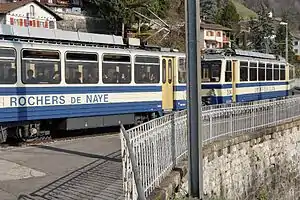 Double-headed motor coaches Bhe 4/8 301 and 304 at Glion | ||||||||||||||||||||||||||||||||||||||||||||||||||||||||||||||||||||||||||||||||||||||||||||||||||||||||||||||||||||||||||||||||||||||||||||||||||||||||||||||||||||||||||||||||||||||||||||||||||||||||||||||||||||||||||||||||||||||||||||||||||
| Overview | ||||||||||||||||||||||||||||||||||||||||||||||||||||||||||||||||||||||||||||||||||||||||||||||||||||||||||||||||||||||||||||||||||||||||||||||||||||||||||||||||||||||||||||||||||||||||||||||||||||||||||||||||||||||||||||||||||||||||||||||||||
| Status | Open | |||||||||||||||||||||||||||||||||||||||||||||||||||||||||||||||||||||||||||||||||||||||||||||||||||||||||||||||||||||||||||||||||||||||||||||||||||||||||||||||||||||||||||||||||||||||||||||||||||||||||||||||||||||||||||||||||||||||||||||||||
| Owner | Transports Montreux-Vevey-Riviera | |||||||||||||||||||||||||||||||||||||||||||||||||||||||||||||||||||||||||||||||||||||||||||||||||||||||||||||||||||||||||||||||||||||||||||||||||||||||||||||||||||||||||||||||||||||||||||||||||||||||||||||||||||||||||||||||||||||||||||||||||
| Locale | Canton of Vaud, Switzerland | |||||||||||||||||||||||||||||||||||||||||||||||||||||||||||||||||||||||||||||||||||||||||||||||||||||||||||||||||||||||||||||||||||||||||||||||||||||||||||||||||||||||||||||||||||||||||||||||||||||||||||||||||||||||||||||||||||||||||||||||||
| Termini | ||||||||||||||||||||||||||||||||||||||||||||||||||||||||||||||||||||||||||||||||||||||||||||||||||||||||||||||||||||||||||||||||||||||||||||||||||||||||||||||||||||||||||||||||||||||||||||||||||||||||||||||||||||||||||||||||||||||||||||||||||
| Service | ||||||||||||||||||||||||||||||||||||||||||||||||||||||||||||||||||||||||||||||||||||||||||||||||||||||||||||||||||||||||||||||||||||||||||||||||||||||||||||||||||||||||||||||||||||||||||||||||||||||||||||||||||||||||||||||||||||||||||||||||||
| Type | Rack railway | |||||||||||||||||||||||||||||||||||||||||||||||||||||||||||||||||||||||||||||||||||||||||||||||||||||||||||||||||||||||||||||||||||||||||||||||||||||||||||||||||||||||||||||||||||||||||||||||||||||||||||||||||||||||||||||||||||||||||||||||||
| History | ||||||||||||||||||||||||||||||||||||||||||||||||||||||||||||||||||||||||||||||||||||||||||||||||||||||||||||||||||||||||||||||||||||||||||||||||||||||||||||||||||||||||||||||||||||||||||||||||||||||||||||||||||||||||||||||||||||||||||||||||||
| Opened | Glion–Rochers-de-Naye 1892 Montreux-Glion 1909 | |||||||||||||||||||||||||||||||||||||||||||||||||||||||||||||||||||||||||||||||||||||||||||||||||||||||||||||||||||||||||||||||||||||||||||||||||||||||||||||||||||||||||||||||||||||||||||||||||||||||||||||||||||||||||||||||||||||||||||||||||
| Technical | ||||||||||||||||||||||||||||||||||||||||||||||||||||||||||||||||||||||||||||||||||||||||||||||||||||||||||||||||||||||||||||||||||||||||||||||||||||||||||||||||||||||||||||||||||||||||||||||||||||||||||||||||||||||||||||||||||||||||||||||||||
| Line length | 10.3 km (6.4 mi) | |||||||||||||||||||||||||||||||||||||||||||||||||||||||||||||||||||||||||||||||||||||||||||||||||||||||||||||||||||||||||||||||||||||||||||||||||||||||||||||||||||||||||||||||||||||||||||||||||||||||||||||||||||||||||||||||||||||||||||||||||
| Rack system | Abt | |||||||||||||||||||||||||||||||||||||||||||||||||||||||||||||||||||||||||||||||||||||||||||||||||||||||||||||||||||||||||||||||||||||||||||||||||||||||||||||||||||||||||||||||||||||||||||||||||||||||||||||||||||||||||||||||||||||||||||||||||
| Track gauge | 800 mm (2 ft 7+1⁄2 in) | |||||||||||||||||||||||||||||||||||||||||||||||||||||||||||||||||||||||||||||||||||||||||||||||||||||||||||||||||||||||||||||||||||||||||||||||||||||||||||||||||||||||||||||||||||||||||||||||||||||||||||||||||||||||||||||||||||||||||||||||||
| Electrification | 850 V, DC, overhead line | |||||||||||||||||||||||||||||||||||||||||||||||||||||||||||||||||||||||||||||||||||||||||||||||||||||||||||||||||||||||||||||||||||||||||||||||||||||||||||||||||||||||||||||||||||||||||||||||||||||||||||||||||||||||||||||||||||||||||||||||||
| Highest elevation | 1,970 m (6,463 ft) | |||||||||||||||||||||||||||||||||||||||||||||||||||||||||||||||||||||||||||||||||||||||||||||||||||||||||||||||||||||||||||||||||||||||||||||||||||||||||||||||||||||||||||||||||||||||||||||||||||||||||||||||||||||||||||||||||||||||||||||||||
| Maximum incline | 22% | |||||||||||||||||||||||||||||||||||||||||||||||||||||||||||||||||||||||||||||||||||||||||||||||||||||||||||||||||||||||||||||||||||||||||||||||||||||||||||||||||||||||||||||||||||||||||||||||||||||||||||||||||||||||||||||||||||||||||||||||||
| ||||||||||||||||||||||||||||||||||||||||||||||||||||||||||||||||||||||||||||||||||||||||||||||||||||||||||||||||||||||||||||||||||||||||||||||||||||||||||||||||||||||||||||||||||||||||||||||||||||||||||||||||||||||||||||||||||||||||||||||||||
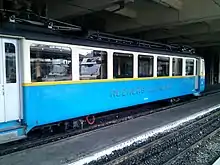
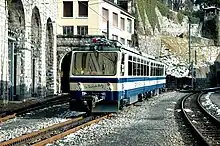

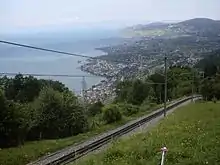


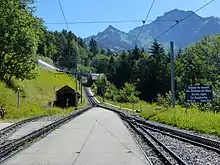
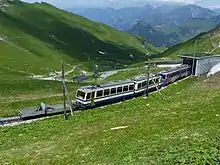
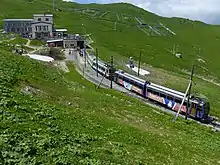

The line was originally built as two separate lines by two different companies, the Chemin de fer Glion–Rochers-de-Naye (GN) and the Chemin de fer Montreux–Glion (MGI). Today, the line is owned and operated by Transports Montreux–Vevey–Riviera.
Since 2017, the line is operated with original Belle Epoque carriages preserved and restored by the company Montreux-Oberland Bernois (MOB).[2]
History
Glion to Rochers-de-Naye
The first section of the line to open was the Glion to Rochers-de-Naye railway, which was built by the Chemin de fer Glion–Rochers-de-Naye company (GN), and opened in 1892. Initially Glion was reached by the Territet–Glion funicular, which departed from a lower terminus opposite Territet station, the first station east of Montreux station on the Simplon railway.
The Glion to Rochers-de-Naye railway was built to a gauge of 800 mm (2 ft 7+1⁄2 in), and the line was operated by steam locomotives using the rack and pinion system devised by Roman Abt.
Montreux to Glion
In 1909, the Montreux to Glion railway opened, built by the Chemin de fer Montreux-Glion company (MGl). This ran from a lower terminus within Montreux station, and at its upper end made an end-to-end junction with the Glion to Rochers-de-Naye line. A cross-platform interchange was retained between both lines and the Territet-Glion funicular.
The Montreux to Glion railway was built to the same gauge and rack system as the Glion to Rochers-de-Naye railway, but was electrically operated from the start. Until 1938, when the Glion to Rochers-de-Naye line was electrified, trains were handed over in Glion between electric and steam locomotives. At the same time, electric railcars took over most services, leaving freight and peak traffic, service trains and snow blowing to the electric locomotives.
Merger
Even after through railcars took over most services, the two lines remained the property of different companies. The two companies finally merged in 1987, to form the Chemin de fer de Montreux–Glion–Rochers-de-Naye company (MGN). In 1992 this company merged with the Territet-Glion funicular to form the Chemin de fer Montreux–Territet–Glion–Rochers-de-Naye company (MTGN).
In 2001, the MTGN was merged into Transports Montreux-Vevey-Riviera (MVR), a company that operates a number of railway lines in the Montreux area. It is marketed under the Golden Pass Services' banner.
Closures
In May 2008 the Montreux to Glion section of the line was closed so that work on the lining of the Tunnel de Valmont could be carried out. It reopened on schedule on 2 June ready for the summer season. During this closure the Glion to Caux and Rochers de Naye section had operated normally with the Montreux to Glion section being covered by a replacement bus service.
Route
The railway from Montreux, which departs from platform 8 of the main line Montreux railway station, begins to climb steeply almost as soon as it leaves the station and enters the first of many tunnels. The line changes direction by a series of minimum radius curves, views of Lake Geneva alternating from side to side, before reaching the station at Glion. The workshops and depot are alongside the line as it leaves Glion, the main shops accessed from a traverser set off a loop line alongside the main line.
The line continues higher to the small village of Caux passing through Alpine meadows which, in the Springtime, are full of wild growing narcissus, forget-me-nots and others, before reaching its upper terminus at Rochers-de-Naye, the home of the Marmot Paradise, a centre where seven varieties of these small mammals can be seen in a natural environment. From here there are views over Lake Geneva and across to the French Alps.
The line is 10.36 km (6.4 mi) long and has a vertical climb of 1,575 m (5,167 ft). This is made up of the Montreux - Glion section, which climbs 292 m (958.0 ft) in 2.73 km (1.7 mi), whilst the Glion - Rochers-de-Naye climbs 1,283 m (4,209 ft) in 7.63 km (4.7 mi).[1]
The line uses track of 800 mm (2 ft 7+1⁄2 in) gauge and the rack and pinion system devised by Roman Abt. It is electrified using 850 V DC supplied by overhead lines. Passing loops are situated in the stations at Glion, Caux, Paccot and Jaman.[1]
Rolling stock
Locomotives
| No. | Name | Class | Builders details | Date Built | Notes. |
|---|---|---|---|---|---|
| 1 | HGe 2/2 | SLM/BBC/MFO | 1909 | Lost in Avalanche in 1966. | |
| 1 | H 2/3 | SLM | 1992 | Sold to BRB 2005, becoming their No.16. | |
| 2 | HGe 2/2 | SLM/BBC/MFO | 1909 | Fitted with a new "old style" wider body in 1986. | |
| 3 | Veytaux (e) | HGe 2/2 | SLM/BBC/MFO | 1909 | Received new modern body in 1976, renumbered 101. In 1998 returned to No.3. Semi-permanently coupled to snowplough. Destroyed in accident in 2011. |
| 4 | Brienz | Hm 2/2 | Buhler/Caterpillar | 1973 | New to BRB as No.8, sold to MGN in 1996. Overhauled at Chernex in 2009 with fitting of larger engine bonnet and repaint in bright red livery.[3] |
| 11 | Hem 2/2 | Stadler | 2013 | Delivered December 2013.Multiple working fitted to work with No.12. Bright red livery | |
| 12 | Hem 2/2 | Stadler | 2013 | Delivered December 2013.Multiple working fitted to work with No.11. Bright red livery | |
Railcars
| No. | Name | Class | Builders details | Date Built | Notes. |
|---|---|---|---|---|---|
| 201 | Bhe 2/4 | SLM/BBC | 1939 | ex ABhe 2/4, Scrapped March 2011 | |
| 202 | Bhe 2/4 | SLM/BBC | 1939 | ex ABhe 2/4, Scrapped April 2007 | |
| 203 | Bhe 2/4 | SLM/BBC | 1939 | ex ABhe 2/4 Restored August 2023 | |
| 204 | Bhe 2/4 | SLM/BBC | 1939 | ex ABhe 2/4 Scrapped April 2021 | |
| 205 | Bhe 2/4 | SLM/BBC | 1939 | ex ABhe 2/4, Scrapped April 2007 | |
| 206 | Bhe 2/4 | SLM/BBC | 1949 | ex ABhe 2/4, Scrapped July 2000 | |
| 207 | Bhe 2/4 | SLM/BBC | 1949 | ex ABeh 2/4
Strucked off 2018 | |
| 208 | Bhe 2/4 | SLM/BBC | 1966 | ex ABhe 2/4, Scrapped April 2007 | |
| 301 | Montreux | Bhe 4/8 | SLM/Siemens | 1983 | (b) |
| 302 | Veytaux (e) | Bhe 4/8 | SLM/Siemens | 1983 | (b)(c) |
| 303 | Villeneuve | Bhe 4/8 | SLM/Siemens | 1983 | (b)(d) |
| 304 | La Tour de Peilz | Bhe 4/8 | SLM/Siemens | 1992 | (b) |
| 305 | Bhe 4/8 | MOB Chernex / Siemens | 2010 | (b)(f) Delivered to traffic w/c 30.11.10 | |
Abbreviations.
- (b) Fitted for multiple unit with two or three double headed motor coaches serie Bhe 4/8 301-305.
- (c) Carries "Marmot Paradis" livery[3]
- (d) Carries "Pere Noel" livery, (marking the visit of Santa to Rochers de Naye).[3]
- (e) No.302 carries "Veytaux" nameplate low down on cab side on front (uphill) cab. Name removed from locomotive No.3 which is now unnamed.
- (f) Painted in new "Golden Pass" gold/white livery from new.[3]
- BBC : Brown, Boveri & Cie
- SLM : Swiss Locomotive and Machine Works, Winterthur
- MFO : Maschinenfabrik Oerlikon
Rotary Snowplow
| No. | Name | Class | Builders details | Date Built | Notes. |
|---|---|---|---|---|---|
| 3 | Xrote | RACO/MFO/Beilhack | 1954 | Electric rotary snowplough | |
| 4 | Xrote | 2013 | Electric rotary snowplough | ||
Preserved Coaches
| Previous Company | No. | Class | Builders details | Seats | Date Built | Notes. |
|---|---|---|---|---|---|---|
| Montreux-Glion | 2 | BC | Luzern, Company not known | 56 in 7 comp. | 1908 | Built for the opening of the line |
| Montreux-Glion | 1908 | Built for the opening of the line | ||||
| Glion-Rochers de Naye | 16 | BC | ||||
- Coaches of the Montreux-Glion Railway are restored to original red livery, usually kept at Glion and work with Locomotive No.2. During its time at the line also worked with steam locomotive No.1.[3]
- Coach No.16 is painted a dark blue livery with lighter blue panels. Also worked with steam locomotive No.1.[3]
Services
The line operates throughout the year, and provides an hourly service in each direction between Montreux and Rochers de Naye from around 09:00 to dusk. Additional services between Montreux and Caux operate in the early morning, in the evenings, and during peak periods. The trains are timed to offer connections at Montreux with main line services of the Swiss Federal Railways and the Montreux–Lenk im Simmental line.[4]
See also
References
- Eisenbahnatlas Schweiz. Cologne: Schweers + Wall. 2012. pp. 72–73. ISBN 978-3-89494-130-7.
- La Belle Epoque fait son grand retour sur la ligne des Rochers-de-Naye, 24 heures. ("Afin de relancer sa ligne Belle Epoque disparue depuis de longues années, la compagnie vient de restaurer quatre voitures historiques construites entre 1892 et 1907, qui étaient restées inutilisées dans ses hangars.")
- Livery details by personnel observation, last updated December 2013
- "Horaire Montreux–Glion–Caux–Rochers-de-Naye". GoldenPass. Retrieved 8 December 2012.
External links
 Media related to Chemin de fer Montreux–Glion–Rochers-de-Naye at Wikimedia Commons
Media related to Chemin de fer Montreux–Glion–Rochers-de-Naye at Wikimedia Commons- Official web site of the Montreux–Glion–Rochers-de-Naye railway